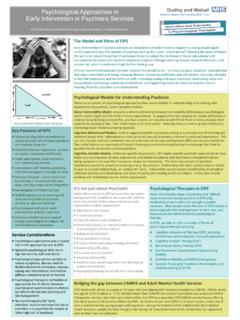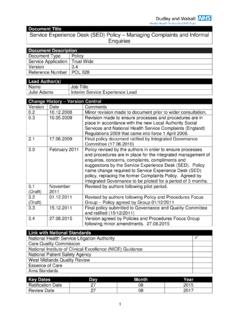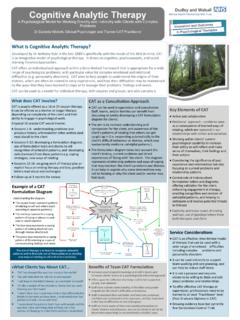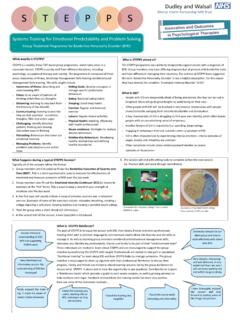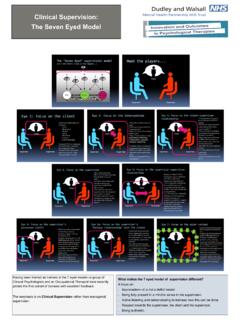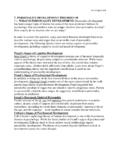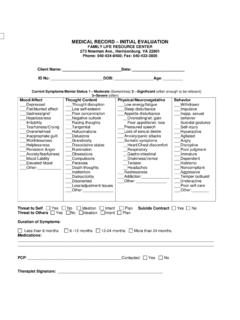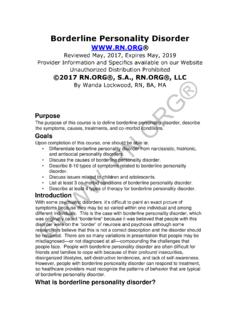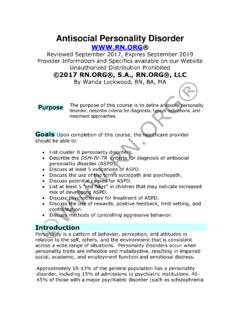Transcription of An Introduction to Radically Open-Dialectical …
1 An Introduction to Radically Open-Dialectical Behaviour therapy (RO-DBT) for Disorders of Over-control Dr Brian M. Levy Consultant Clinical Psychologist Joint Associate Director of Psychology and Psychological Therapies Self-Control Tendencies Self-Control Tendencies Psychological Well-being Optimal Control Under-control (high disinhibition) Self-Control Tendencies Self-Control Tendencies Psychological Well-being Optimal Control Under-control (high disinhibition) Over-control (high constraint) Optimal Well-Being (Lynch, Hempel, Barnsley, & Clark, in prep.)
2 Receptivity and Openness: to novel stimuli or disconfirming feedback in order to learn Flexible-Control: adaptive to changing environmental condition Social Connectedness: species survival required capacities to form long-lasting bonds and work in groups or tribes These characteristics are biologically determined as shown by research that indicates that our parasympathetic nervous systems innervate systems that can signal social safety and cooperation to others Defining Over-control: Three core deficits manifested by high risk aversion, avoidance of novelty and automatic discounting of critical feedback Receptivity and openness manifested by minimisation of distress, inhibited expression and/or disingenuous expression ( , smiling when distressed)
3 Emotional awareness and expression manifested by aloof/distant relationships and low empathy/validation skills Forming intimate relationships Trans-diagnostic Approaches Traditional psychiatric approaches are categorical There has also been a tendency to focus on symptoms without considering underlying personality Personality matters! A failure to address characterological issues results in poor outcomes and recurrent mental health issues RO-DBT is less concerned with psychiatric diagnosis and more concerned with personality style RO-DBT addresses a wide range of severe mental health issues that are renowned for their treatment resistance The Self-Control Dialectic Under-controlled (UC) Over-controlled (OC)
4 Emotionally Disregulated and Impulsive Borderline PD Antisocial PD Binge-Purging Eating Disorders Conduct Disorders Histrionic PD Narcissistic PD ADHD Bipolar Disorder Externalising Disorders Emotionally Constricted and Risk-Averse Obsessive Compulsive PD Paranoid PD Avoidant PD Anorexia Nervosa (restrictive) Chronic Depression Autism Spectrum Disorders Treatment Resistant Anxiety Internalising Disorders Environment Punishes Being imprecise or making a mistake ( , describing something in a vague manner; using an incorrect word; being unprepared; not having an answer) Self-initiated behaviours ( , acting silly; eating chocolate at breakfast; stating an unpopular or unique opinion; standing out in a crowd; dancing with abandon) Displays of emotion ( , crying about Bambi; complainers and whiners are weak and selfish.)
5 Life is tough get over it; stop crying and get back to work; never let them see you sweat) Requests for nurturance ( , asking for a hug or understanding; love is fake and romance is for fools; dependence means your weak; aloofness is normal) Environment Rewards Appearing Perfect ( , planning ahead is imperative; orderliness and structure is key; being correct is more important than being liked) Following Rules ( , parent boasts about child being obedient; always do the socially proper thing; smile even when miserable; always be prepared; always be polite) Tolerance of Pain ( , praised for not crying when they fall down; life is not meant to be fun.
6 Grin and bear it) A novel mechanism of change: open Expression = Trust = Social Connectedness 10 Over-control Flexible-control Frozen or Masked Inner Feelings Perceived as Untrustworthy,Stilted, or inauthentic Socially Distracted Feel Depressed or Anxious open Expression & Self-Disclosure Perceived as Trustworthy& Genuine Socially Connected Feel Safe & Secure RO-DBT Treatment Plan RO-DBT is a 29-week programme that tackles OC by addressing the 5 OC themes, namely:- Inhibited emotional expression, caution and over-vigilance, rigid behaviour, aloof and distant relationships, and envy and bitterness.
7 The following skills modules are taught in a weekly behaviours to Increase behaviours to Decrease Core Mindfulness (2 weeks) Rigidity and rule governance Imperative of correctness Compulsivity Interpersonal Effectiveness (6 weeks) Aloofness and distance Inability to appear vulnerable Emotion Regulation (6 weeks) Masking inner feelings Envy and bitterness Distress Tolerance (1 week) Self-care neglect High personal need for structure Radical Openness (new) (8 weeks) Low openness Avoid risk and novelty Disregard feedback High distrust and suspicion Low validation of others Deficient forgiveness and compassion
